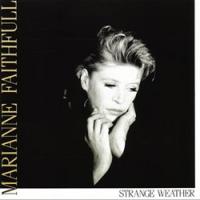Willner Produces Faithful Classic
Does an album that didn’t make a Billboard chart blip when first issued in 1987 deserve to be reissued on double 45rpm 180g gram vinyl?
No doubt. Yet no doubt this impeccably conceived, produced, engineered and performed album does not make for easy or even pleasant listening—especially for those old enough to remember and know Marianne Faithful only from her “swinging London” days on the arms of Mick Jagger and as the precious young, sweet-voiced “bird” singing “As Tears Go By.”
Does an album that didn’t make a Billboard chart blip when first issued in 1987 deserve to be reissued on double 45rpm 180g gram vinyl?
No doubt. Yet no doubt this impeccably conceived, produced, engineered and performed album does not make for easy or even pleasant listening—especially for those old enough to remember and know Marianne Faithful only from her “swinging London” days on the arms of Mick Jagger and as the precious young, sweet-voiced “bird” singing “As Tears Go By.”
Yet those old enough to remember that can listen here and contemplate their own move through time as Faithful, in a deep, coarsened voice covers mostly standards or obscurities, daringly so in the case of songs long associated with others, some legendary like Billie Holiday.
The album was Faithful’s first complete album since kicking heroin the previous year. Producer Hal Wilner had used her on his 1985 Lost in the Stars Kurt Weill tribute album (A&M SP 9-5104 LP-the CD includes more tracks) to sing “Ballad of the Soldier’s Wife” arranged by Chris Spedding.
Her performance perfectly captured the Weill gestalt and was among the eclectic set’s most highly regarded. Thus was born the idea for this album—a package that as novelist Terry Southern writes for the rear jacket notes “…takes up where Lotte Lenya and Marlene Dietrich leave off”—though with no set destination.
Much old record listening followed with Willner, Chris Blackwell and Tom Waits settling on twenty tunes from which to choose the album’s final track listing. They decided to bring in separately Bill Frisell and Mac “Dr. John” Rebennack, both of whom had been given tapes of the tracks to be explored.
In the end, the demo sessions became master takes, with the addition to the core group of guitarist Robert Quine, drummer J.T. Lewis and bassist Fernando Saunders. Strings and occasional brass and some other instruments flesh out the always airy and delicate arrangements (Lew Soloff on trumpet, Garth Hudson on accordion, etc.).
The songs span a wide time frame and genre range and include new material written for the album as well as some obscurities. The title track is a Tom Waits/Kathleen Brennan original and Doc Pomus and Rebenack contribute “Hello Stranger.” The others include the familiar “Boulevard of Broken Dreams”,“Yesterdays,” Ledbetter’s “I Ain’t Goin’ Down to the Well No More,” (sung a capella) and Bob Dylan’s “I’ll Keep It With Mine,” popularized by Sandy Denny’s Fairport Convention, which, like some other English groups at the time, got ahold of some of Dylan’s publishing demos and recorded them before he did.
There’s also a reprise of “As Tears Go By” that takes on new weight and poignancy but is at first somewhat difficult to listen to if you grew up (and old!) on the original. That’s tracked one song before the final one, which is “A Stranger On Earth,” the ultimate in alienation songs, popularized by Dinah Washington.
Making this work depended on arranging and engineering perfection. Staging the musical backdrop was as important as the instrumentation and for that Willner called on Joe Ferla, mixer of the Pat Metheny album also in this month’s “…Rotation.”
Ferla’s impeccable engineering and mixing tastes compliment the instrumentation by putting everything on a spacious, deep and somewhat dark and mysterious soundstage. Instruments glide and hover on the deep stage and have just the right amount of body to be solid, yet sufficient lightness of being to feel as if any of them could simply drift away at any moment. Bill Frisell’s guitar floats delicately in an echo balloon.
Of course the centerpiece is Faithfull’s deepened, coarsened voice and while the older tunes are well-served and her take of “Yesterdays” is arguably equal to Billie Holiday’s, its her performance on the Waits title song that lingers long after the stylus has reached side four’s lead out groove.
The recording quality is superb and the double 45 format perfectly suits the material: you might not want to consume this in greater quantities than a few tunes at a time.
Don’t play this album too loudly. In fact, it works as well played so low you hear it as if you’re eavesdropping from the next room as it does as if you’re sitting in front of the stage.
Late night listening doesn’t get any better. Don’t play when the sun is up though: you’ll miss the point!
- Log in or register to post comments



